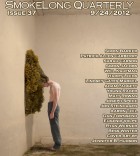The first element that really hooked me about “Clearings” was the use of language, how it never quite gave itself away, but also never left me feeling held at arm’s length. Can you talk about how you plan word choice/language/ phrasing in your writing, and specifically in this story?
First, thank you for saying so. In terms of word choice and phrasing, I think that writing is a combination of intuition and influence: certain combinations and structures strike me as beautiful (for force, concision, deftness, lilt, etc.), and that inherent leaning is colored by other writers and poets I admire (Melville, Woolf, Dickinson, Heaney, Hopkins, Shakespeare, Emily Brontë) and, well, the influence of life, since the writing matures and moves as my mind does. In “Clearings” specifically, method is a combination of my poetic instinct to urgently cut all fat, and fiction’s claim to the slower building of narrative.
“Clearings” is built on what is not: “She was not fifteen…” / “not fourteen…” How did you come to use negation instead of affirmation when composing this piece?
I could poeticize this, saying such lack of definitiveness creates dimension—obviously, I thought of doing so. 🙂 The fact is, however, I’m not quite sure; it’s a combination of intuition and influence that this question only just brought to my conscious thinking.
Also, the title “Clearings” seems slightly in opposition to the story, which is actually told on a single clearing. Is this title meant to variegate the subject, to propel forward the scope of desire as a theme in this vignette?
“Variegate the subject” likely puts it better than I can. The protagonist in “Clearings” is living through several levels of experience (waiting for the ship, trying to get comfortable, recollecting the proscription of schoolteachers) simultaneously, like so many of us do; I’m interested in how a constant ‘clearing’ and repurposing of our mental and physical landscape is necessitated by constant “changes of mind.”
Some say that writers should never use exclamation points. Some say you should be given three for your lifetime. Others, like Sara Levine, use them even in a title (see Treasure Island!!!). And you, you use one in the penultimate sentence of this piece. Can you talk to us about that single moment of punctuation?
Ha! Well, two things here. Whatever little aphorisms exist in one’s mind about punctuation or word choice, fiction is a mode that, most centrally, involves the development of characters; those characters ought not simply be snippets of how I speak, whether or not I would exclaim this or that, or how I would sit on a check blanket. So that exclamation mark belonged to my protagonist in some important way—I hold tight to that vision. Next, I think that such truisms about the act of writing (to which, for me, the excision of exclamation marks once belonged) are not the business of artistic genius. One can have tastes about exclamation marks or ellipsis or semi-colons, but art is part of the uncanny, and such didacticism amount to workshop talk, not sublimity. Here’s the end of my polemic, J.A.: junk all your domestic writerly sprites. See what happens when you do the thing that is anathema to your creative tastes, lest the Spirit in you remain shriveled in its “completion.”
Is “Clearings” a part of something larger, or a stand-alone story? And if you are at work on either a full-length manuscript or a collection of stories, can you talk to us about where you are in that process, and how it is going so far?
A first book of poems, Roads (Cherry Grove), is forthcoming in spring, 2013; “Clearings” is part of a fiction project written in entirely flash-style chapters—it is, in fact, the first chapter of that project. It’s a bit stalled at the moment, but this publication has refocused my attention. Autumn is a big writing season for me, so perhaps I’ll be knocking on SLQ‘s and MLP’s door next year with a fiction manuscript in good repair.



 The SmokeLong Grand Micro Contest (The Mikey) is now an annual competition celebrating and compensating the best micro fiction and nonfiction online.
The SmokeLong Grand Micro Contest (The Mikey) is now an annual competition celebrating and compensating the best micro fiction and nonfiction online.